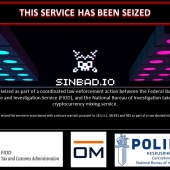-
US sanctions 12 Kaspersky Lab execs for working in Russian tech sector
The Treasury Department's Office of Foreign Assets Control (OFAC) has sanctioned twelve Kaspersky Lab executives for operating in the technology sector of Russia.
- June 21, 2024
- 01:32 PM
 6
6
-
US govt sanctions cybercrime gang behind massive 911 S5 botnet
The U.S. Treasury Department has sanctioned a cybercrime network comprising three Chinese nationals and three Thailand-based companies linked to a massive botnet controlling a residential proxy service known as "911 S5."
- May 28, 2024
- 03:02 PM
 0
0
-
US woman allegedly aided North Korean IT workers infiltrate 300 firms
The U.S. Justice Department charged five individuals today, a U.S. Citizen woman, a Ukrainian man, and three foreign nationals, for their involvement in cyber schemes that generated revenue for North Korea's nuclear weapons program.
- May 16, 2024
- 03:17 PM
 1
1
-
LockBit ransomware admin identified, sanctioned in US, UK, Australia
The FBI, UK National Crime Agency, and Europol have unveiled sweeping indictments and sanctions against the admin of the LockBit ransomware operation, with the identity of the Russian threat actor revealed for the first time.
- May 07, 2024
- 10:04 AM
 2
2
-
US govt sanctions Iranians linked to government cyberattacks
The Treasury Department's Office of Foreign Assets Control (OFAC) has sanctioned four Iranian nationals for their involvement in cyberattacks against the U.S. government, defense contractors, and private companies.
- April 23, 2024
- 02:40 PM
 1
1
-
US sanctions crypto exchanges used by Russian darknet market, banks
The U.S. Treasury Department's Office of Foreign Assets Control (OFAC) has sanctioned three cryptocurrency exchanges for working with OFAC-designated Russian dark web markets and banks.
- March 25, 2024
- 05:20 PM
 0
0
-
US sanctions APT31 hackers behind critical infrastructure attacks
The U.S. Treasury Department has sanctioned a Wuhan-based company used by the Chinese Ministry of State Security (MSS) as cover in attacks against U.S. critical infrastructure organizations.
- March 25, 2024
- 12:06 PM
 1
1
-
Microsoft to shut down 50 cloud services for Russian businesses
Microsoft plans to limit access to over fifty cloud products for Russian organizations by the end of March as part of the sanctions requirements against the country issued by EU regulators last December.
- March 23, 2024
- 10:14 AM
 2
2
-
U.S. sanctions Predator spyware operators for spying on Americans
The U.S. has imposed sanctions on two individuals and five entities linked to the development and distribution of the Predator commercial spyware used to target Americans, including government officials and journalists.
- March 05, 2024
- 01:09 PM
 0
0
-
US, UK, Australia sanction REvil hacker behind Medibank data breach
The Australian government has announced sanctions for Aleksandr Gennadievich Ermakov, a Russian national considered responsible for the 2022 Medibank hack and a member of the REvil ransomware group.
- January 23, 2024
- 08:40 AM
 0
0
-
US govt sanctions North Korea’s Kimsuky hacking group
The Treasury Department's Office of Foreign Assets Control (OFAC) has sanctioned the North Korean-backed Kimsuky hacking group for stealing intelligence in support of the country's strategic goals.
- November 30, 2023
- 05:08 PM
 2
2
-
US seizes Sinbad crypto mixer used by North Korean Lazarus hackers
The U.S. Department of the Treasury has sanctioned the Sinbad cryptocurrency mixing service for its use as a money-laundering tool by the North Korean Lazarus hacking group.
- November 29, 2023
- 11:49 AM
 1
1
-
Ukraine says it hacked Russian aviation agency, leaks data
Ukraine's intelligence service, operating under the Defense Ministry, claims they hacked Russia's Federal Air Transport Agency, 'Rosaviatsia,' to expose a purported collapse of Russia's aviation sector.
- November 27, 2023
- 01:23 PM
 1
1
-
US sanctions Russian who laundered money for Ryuk ransomware affiliate
The U.S. Department of the Treasury's Office of Foreign Assets Control (OFAC) has sanctioned Russian national Ekaterina Zhdanova for laundering millions in cryptocurrency for various individuals, including ransomware actors.
- November 06, 2023
- 12:20 PM
 0
0
-
US and UK sanction 11 TrickBot and Conti cybercrime gang members
The USA and the United Kingdom have sanctioned eleven Russian nationals associated with the TrickBot and Conti ransomware cybercrime operations.
- September 07, 2023
- 10:27 AM
 0
0
-
US sanctions orgs behind North Korea’s ‘illicit’ IT worker army
The Treasury Department's Office of Foreign Assets Control (OFAC) announced sanctions today against four entities and one individual for their involvement in illicit IT worker schemes and cyberattacks generating revenue to finance North Korea's weapons development programs.
- May 23, 2023
- 12:38 PM
 1
1
-
Russian ransomware affiliate charged with attacks on critical infrastructure
The U.S. Justice Department has filed charges against a Russian citizen named Mikhail Pavlovich Matveev (also known as Wazawaka or Boriselcin) for involvement in three ransomware operations that targeted victims across the United States.
- May 16, 2023
- 11:57 AM
 2
2
-
U.S. and U.K. sanction TrickBot and Conti ransomware operation members
The United States and the United Kingdom have sanctioned seven Russian individuals for their involvement in the TrickBot cybercrime group, whose malware was used to support attacks by the Conti and Ryuk ransomware operation.
- February 09, 2023
- 10:21 AM
 6
6
-
The Week in Ransomware - September 16th 2022 - Iranian Sanctions
It has been a fairly quiet week on the ransomware front, with the biggest news being US sanctions on Iranians linked to ransomware attacks.
- September 16, 2022
- 04:26 PM
 0
0
-
US govt sanctions ten Iranians linked to ransomware attacks
The Treasury Department's Office of Foreign Assets Control (OFAC) announced sanctions today against ten individuals and two entities affiliated with Iran's Islamic Revolutionary Guard Corps (IRGC) for their involvement in ransomware attacks.
- September 14, 2022
- 11:43 AM
 0
0

 0
0






















